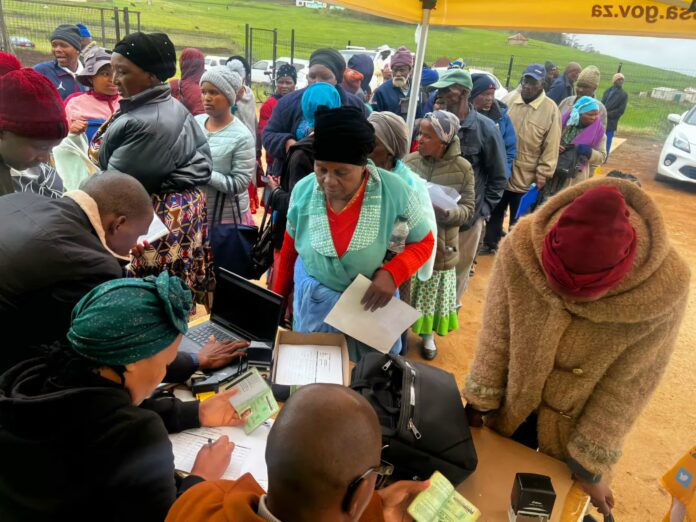The Department of Social Development (DSD) has officially confirmed that SASSA pension grants will not be doubled, despite mounting public pressure and growing economic hardship faced by millions of elderly South Africans.
Responding to widespread calls for the older persons’ grant to be increased to R5,000 per month, DSD officials told Parliament this week that while the appeal is understandable, such a move is “financially unfeasible.”
“R2 300 is not nearly enough for anyone to survive on,” said social development advocate Riyad Isaac, speaking before Parliament’s portfolio committee. “Our elderly are the backbone of this country, and we owe them dignity and care. Many pensioners today are not recipients of formal pensions and are forced to rely solely on this grant.”
Currently, individuals aged 60 to 74 receive R2 310, while those aged 75 and above receive R2 330. A R10 increase is expected in October 2025, but many argue this adjustment falls far short amid rising prices for food, rent, electricity, and other basic necessities.
A nation at a crossroads
Calls for a significant increase — or even a doubling — of the grant come at a time when South Africa’s welfare budget is already under strain. The DSD, which oversees the South African Social Security Agency (SASSA), is responsible for distributing monthly grants to more than 19 million citizens, including over 4 million older persons.
Dr. Maureen Mogotsi, acting chief director at DSD, addressed the issue directly:
“If we were to double the pensioners’ grant to R5 000, it would cost the government an additional R246 billion, which would nearly double the current social grant budget,” she explained. “We are truly between a rock and a hard place.”
For the 2025/26 financial year, R285 billion has been allocated to social grants. Despite being the highest of all core SASSA grants, the Older Persons Grant is said to exceed the Upper Bound Poverty Line. In contrast, the R560 Child Support Grant remains below the food poverty line, raising difficult questions about prioritisation. Read more on the 2025 update on children’s SASSA grants here.
“It (Older Persons Grant) already exceeds the upper poverty line. While, in contrast, the R560 SASSA Child Support Grant is below the food poverty line, even though child poverty is higher than adult poverty. You see, we are between a rock and a hard place. Who should we consider first? It’s simply not possible for us to double SASSA pension grants,” Mogotsi concluded.
The human cost
Isaac warned that the statistics fail to reflect the lived experiences of many older citizens:
“Some might have a pension, which is lucrative. But the majority of people are not that fortunate. Many live below the poverty line and struggle to make ends meet. R2 310 is not nearly enough if you look at the rates and rental they have to pay. There is no way we should allow pensioners to survive on only that amount,” he told Parliament.
He also highlighted the plight of rural pensioners who often survive on food parcels or community handouts.
“If we look beyond race and status, we see vulnerable people who have built this nation, now abandoned in poverty,” Isaac added.
A growing crisis
According to Stats SA, South Africa had over 5.5 million people aged 60 and older in 2023, with women making up the majority of this demographic. The Western Cape has the highest proportion of elderly citizens, at 10.8% of the provincial population.
As the ageing population grows, so does the urgency for sustainable and dignified retirement support — especially in a country battling economic stagnation and chronic unemployment.
A possible compromise?
While doubling the grant may be out of reach, Isaac has proposed a more measured solution:
“Even a R500 increase would make a big difference. It’s not everything, but it’s something,” he said.
The idea of incremental increases — rather than a sudden jump to R5,000 — is gaining traction among some lawmakers and civil society groups. Whether this will be addressed in the upcoming Medium-Term Budget Policy Statement (MTBPS) remains to be seen.
What beneficiaries should know
SASSA has reassured beneficiaries that May 2025 payments will proceed as scheduled, and recipients are free to withdraw funds from any bank of their choice. For unresolved issues, please visit your nearest SASSA office.
For additional info, read:

